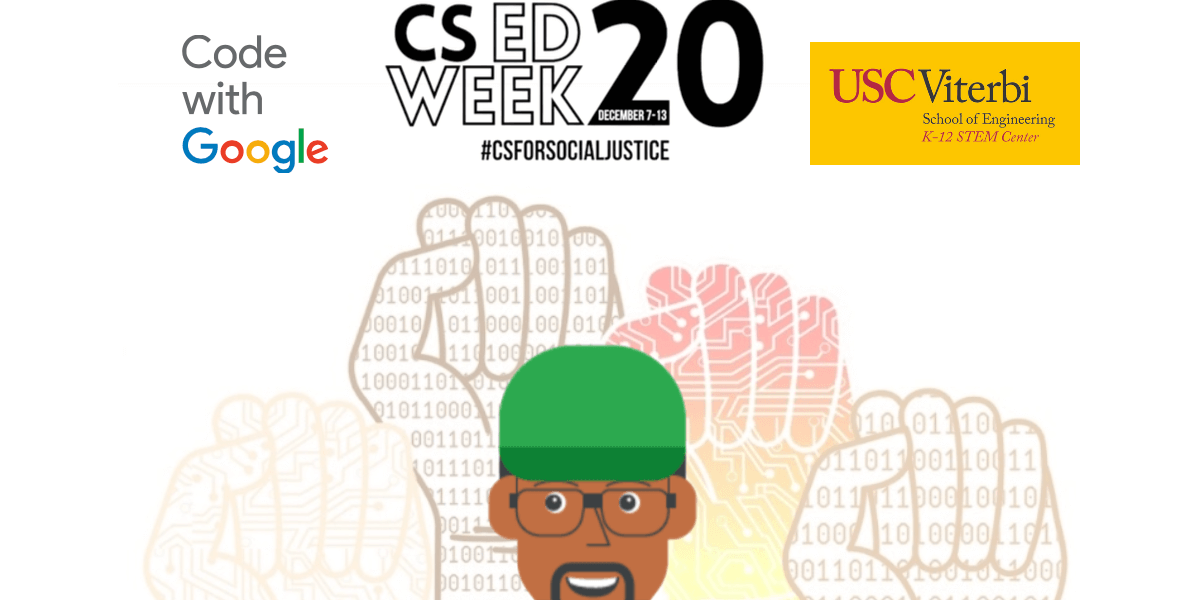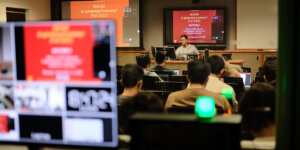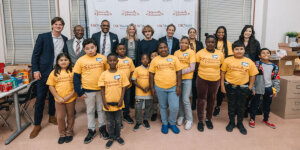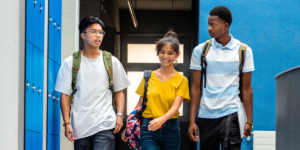
USC Viterbi’s K-12 STEM Center features Anthony Mays, software engineer at Google, as headline speaker (PHOTO/Viterbi K-12 STEM Center)
“I was eight years old when I was first exposed to the power of computing,” said Anthony Mays, software engineer at Google. “It was also the first time I felt like I had a stake in my future.”
On Thursday, Dec. 10, as a part of Computer Science Education Week, the Compton, California, native spoke to students from Los Angeles and Compton Unified School Districts (LAUSD and CUSD, respectively) about how as a former foster child and abuse victim, he went on to beat the odds by graduating with a degree from the University of California Irvine in computer science and landing a job at Google.
“Learning computers made me realize that I had the power to change the trajectory of my life. I am thrilled to see you young scholars getting exposure to the treasure,” Mays added.
For one week every year, in honor of computing pioneer Admiral Grace Murray Hopper, millions of students around the world are introduced to computer science or challenged to expand their skills during Computer Science Education Week (#CSEdWeek). All it takes is one hour—hence the idea of “Hour of Code”—to discover that computer science is “fun, and creative, and that it is accessible at all ages, for all students, regardless of background,” according to the Computer Science Teachers Association.
Throughout #CSEdWeek, students and educators can partake in myriad activities, including building trivia chatbots in Python and learning language independent image manipulation, at skill levels ranging from beginner to advanced. Although celebrated during #CSEdWeek, free activities are available year-round from Google’s CS First, Code.org, Tata Consulting Services’ goIT — all of whom partnered with the USC Viterbi K-12 STEM Center this year.
The theme for this year, #CSforSocialJustice, reveals how computer science knowledge and application can serve as a catalyst for social justice, fitting after a tumultuous year of climate conundrums, racial reckonings, and pandemics. Among the many institutions and organizations participating in the week of learning and exploration, from Dec. 7 to Dec. 11, was USC Viterbi’s K-12 STEM Center, co-directed by Katie Mills, Ph.D.
“Computer science is the new frontier for equity in STEM,” Mills said. “To be creative, cure cancer, make movies, understand how to vote, people must have an understanding of computational thinking, and computer science education is our opportunity to introduce that to students.”
Students from LAUSD and CUSD had the opportunity to join coding and robotics workshops hosted by USC Viterbi student organizations like Robogals and USC Rocket Propulsion Laboratory; listen in on panels featuring computer science specialists from Twitter and Microsoft and USC Viterbi computer science majors; and partake in public Code.org challenges with guidance from their instructors and administrators.
“The advice given by the students was extremely valuable,” said a Fremont High School student after the student and industry panel on Tuesday. “It made me see myself as a potential computer scientist and I never would have imagined that.”
In addition to Mays’ Thursday talk, students also heard from Malik Ducard, vice president of content partnerships at YouTube, who discussed how the company relies on computer science to showcase diverse content and perspectives on its platform. On Friday evening, middle and high school students presented solutions to global challenges addressing the United Nation’s Sustainable Development Goals they had worked on over the past eight weeks on the goIT program in a collaboration between Tata Consultancy Services and USC Viterbi’s K-12 STEM Center.
For 40 years, USC Viterbi’s K-12 STEM Center has committed to “increase the number of educationally disadvantaged and historically underrepresented K-12 students who matriculate to four-year universities and graduate with degrees in STEM,” according to co-directors Mills and Darin Gray, Ed.D. To date, the center has collaborated with 18,000 students at 927 schools yearly to provide high impact STEM programs, facilitate K-12 STEM education networks and research, and increase diversity in STEM through targeted outreach—98% of all students served are historically underrepresented in STEM.
“I am extremely passionate about equity in computer science, and I’m really proud that #CSEdWeek was so responsive to the #CSforSocial Justice theme and proactive in bringing visibility to Black and Brown students this year,” Mills said.
All it takes is one hour to be introduced to the incredible possibilities that come with computer science education. Are you up for the challenge?
Published on December 17th, 2020
Last updated on April 8th, 2021











